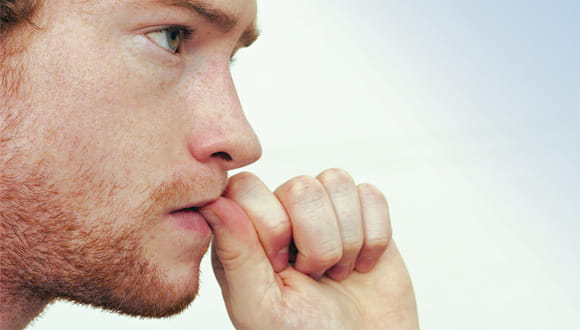Anyone who bites their nails knows how hard it is to kick the habit.
It's a behavior that feels almost automatic, like brushing a loose strand of hair behind your ear or scratching an itchy mosquito bite. A lot of the time, you're not even aware you're doing it.
And even the times when you are aware, the negative connotations — like how it looks unsanitary and, frankly, un-adult — still aren't enough to get you to stop.
Before we move on: This is a safe space. I, too, am a nail biter. You will find no judgment or admonishment from me.
The fact is that chewing at your nails, which the medical community more formally calls onychophagia, holds a sort of power over some people. It certainly feels that way at least.
But why?
Why do people bite their nails?
There's why you start biting your nails, and then there's why keep you doing it.
Nail biting almost always begins in childhood. It's a behavior often associated with stress or anxiety, but it's likely more complicated than that.
For instance, one theory is that it helps some people regulate their emotions — or it feels like it does anyways.
Think of it this way:
- When you're understimulated (aka: bored or dissatisfied), biting your nails feels like it gives you something to do or feel satisfied about.
- When you're overstimulated (aka: excited, nervous or impatient), biting your nails can be a distraction or temporary escape from some overwhelming emotion.
It's still just a theory, but I think many a nail biter, myself included, might find some personal truth there.
So why our nails?
Well, for starters, it's not always our nails. Some people pick at their skin, pull at their split ends, bite at their inner cheek, the list goes on. And there may be an evolutionary tie too — a glance at your pet is the only reminder you need of animals' compulsive grooming behaviors.
But then why do we bite our nails despite the sore fingers and damage caused?
That's where it helps to understand how we form habits, even the "bad" ones.
And, no coincidence, it turns out that nail biting is a classic example of the formula that governs habit formation, which requires the following:
- A consistent cue (same thing, same time, same place)
- A simple behavior (typically one that's deemed useful)
- A reward (inherent or attached to the behavior by you)
- Many repetitions of the above
Your nails are always there. Biting them is as easy as lifting your hand. Somewhere along the way, you attached a reward to it — if we believe the theory, as a way to cope with challenging emotions. Lastly, you likely started biting your nails as a kid and ... just kept doing it.
Habit acquired. The rest, as they say, is history.
Is biting your nails actually bad for you, though?
We all know biting our nails isn't great. But is it bad?
Here are the consequences of biting your nails:
- It can increase your risk of infection around the nail, especially if you bite at your cuticle or the soft tissue around it.
- It can harm your teeth.
- It can spread germs on your hands and fingers to your mouth, increasing your risk of getting sick.
We probably feel the first consequence the most, but it's the last one that's become the most ominous since the COVID-19 pandemic began. An easy-to-spread virus can really make you realize just how many things and surfaces you touch every day. (Related: Where Do Germs Hide?)
Perhaps that's enough to make you consider taking steps to finally kick the habit?
How to stop biting your nails
Whether you're trying to quit for the first time or the millionth, here are tips that can help you stop biting your nails:
1. Identify when you're most prone to do it. Take a mental note of the times or places you're most likely to bite your nails. Even if a trigger isn't avoidable, knowing it exists can make it easier to fend off.
2. Replace nail biting with another activity. Instead of chewing your nails when you're bored or stressed, try using a fidget spinner, squeezing a stress ball, taking a walk or some other activity that can help distract or calm you.
3. Take physical steps to prevent nail biting. Since biting your nails can be an automatic behavior, it may help to put a physical barrier to nail biting in place at the start. For instance, bitter nail polish's taste is designed to deter you from biting your nails. Getting your nails done may be a deterrent as well — just be careful about the type of manicure you choose. Picking or biting at gel nail polish can actually do more harm than good.
4. Give yourself time to break the habit. At the end of the day, breaking a habit is hard and it won't happen overnight. One of the keys to stop biting your nails is to understand what it takes to successfully break a habit. After interrupting the behavior, be purposeful about reminding yourself of the reward for not biting your nails — no more sore fingers or risk of getting sick, for instance. And keep doing so, over and over and over again. If you slip up here and there, don't forget to cut yourself some slack and encourage yourself to try again.
5. Relieve stress and anxiety. If stress is the trigger to get you to pick the habit up over and over again, take stress-alleviating steps such as exercising, doing breathing exercises or yoga, getting outdoors or confiding in a loved one, friend or counselor.


